
Topics
Guests
- Juan GonzálezDemocracy Now! co-host and award-winning columnist at the New York Daily News.
One week after the inauguration of new mayor Bill de Blasio, Melissa Mark-Viverito has been elected speaker of the New York City Council. Democracy Now! co-host and New York Daily News columnist Juan González says Mark-Viverito’s election cements a new political era in New York City where progressives have now filled several major posts, from the mayor on down.
Transcript
AMY GOODMAN: Meanwhile, across the bridge, when you can get over it, in New York, you were at New York City Council. And why this is important for a global audience is, looking at what this new era, if in fact it is, is being ushered in in New York under Bill de Blasio, the new mayor. What happened at the City Council?
JUAN GONZÁLEZ: Well, what I—as I said yesterday at the New York City Council, the last piece of the puzzle in the transformation of New York City politics occurred when the City Council, the members of—the 51 members of the City Council voted unanimously to choose Melissa Mark-Viverito, an East Harlem and South Bronx councilwoman, as their next speaker, the second most powerful post in New York City government after the mayor. And Melissa Mark-Viverito, the co-chair of the Progressive Caucus of the council, becomes the first Latina and person of color to hold a citywide—a Latina to hold a major citywide post as speaker, and that she becomes the fourth and last major figure in the New York City government, after Mayor de Blasio, Letitia James and—the public advocate, and the comptroller, Scott Stringer.
Now all of the major posts in New York City government are held by progressive liberals, Democrats. And it’s really unprecedented in the modern history of the city that there’s been such a populist, now, government. And Melissa was up against five or six different candidates, and the last standing one was Daniel Garodnick, another Democratic moderate liberal, but much more favored by the business and real estate communities, who feel that they have now no representative in city government that they can depend on to respond to their needs.
So, we’re going to see what’s going to happen now. And the first thing that Melissa Mark-Viverito spoke about when she accepted the vote was—or the position, was that she was going to press immediately for an increased minimum wage for low-wage workers, airport workers and others in the city. So I think now, with the mayor behind it and Melissa Mark-Viverito, it’s only going to be a matter of weeks before New York City becomes the first major or huge city in the country to sharply increase the minimum wage.
AMY GOODMAN: And Melissa Mark-Viverito, the newly elected head of the City Council, is a former producer at WBAI, the Pacifica station, the non-commercial community radio station here in New York that Democracy Now! broadcasts on.
JUAN GONZÁLEZ: Yes, and she was subjected over the last few weeks to numerous newspaper articles, many of them attacks on her as—linking her to Evo Morales, because she—the president of Bolivia—because she went there as an observer during one of the presidential races; just yesterday in the New York Post, lambasting her for calling for freedom for the Cuban Five, those accused of espionage against the—
AMY GOODMAN: Got convicted and imprisoned.
JUAN GONZÁLEZ: —or convicted of espionage against the United States; and for many of the other positions she has taken in the past—all aimed at basically turning the council members against her, but did not succeed.
AMY GOODMAN: Well, we’ll certainly continue to follow New York politics as well as the scandal across the river in New Jersey, what will happen to Governor Chris Christie, the—well, person who’s talked about as being the Republican presidential front-runner for 2016.
This is Democracy Now! When we come back, it’s been 50 years since Lyndon Johnson declared the War on Poverty. What’s happened since? And then we’ll go to Iraq to talk about what’s happening in Fallujah and the increasing violence throughout the country. This is Democracy Now! Back in a minute.

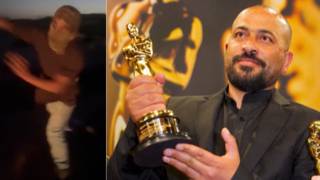

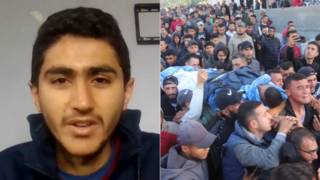
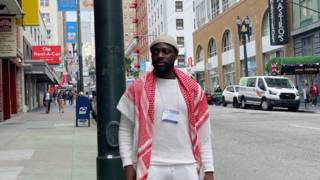





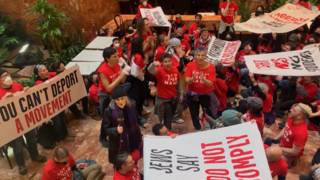
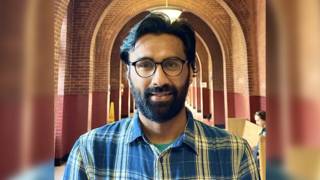
Media Options